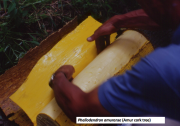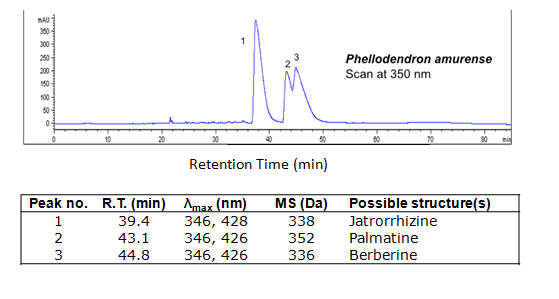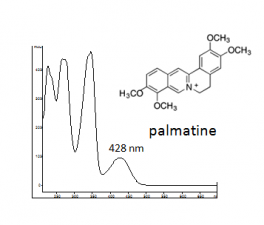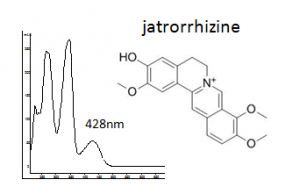Difference between revisions of "Amur cork tree (Phellodendrom amurense Rupr. Rutaceae) LC"
| Line 3: | Line 3: | ||
== Description == | == Description == | ||
| − | Amur cork tree (''Phellodendrom amurense'' Rupr. Rutaceae) is deciduous large trees that are common in forests in mountainous regions of Northern China, Mongolia, Siberia, Korea and Japan [1]. | + | Amur cork tree (''Phellodendrom amurense'' Rupr. Rutaceae) is deciduous large trees that are common in forests in mountainous regions of Northern China, Mongolia, Siberia, Korea and Japan [1]. The inner bark, which is bright yellow, of the tree trunk is used as dyes. |
| − | |||
| − | The inner bark, which is bright yellow, of the tree trunk is used as dyes. | ||
== Historical Importance == | == Historical Importance == | ||
Revision as of 09:53, 4 August 2017
Description
Amur cork tree (Phellodendrom amurense Rupr. Rutaceae) is deciduous large trees that are common in forests in mountainous regions of Northern China, Mongolia, Siberia, Korea and Japan [1]. The inner bark, which is bright yellow, of the tree trunk is used as dyes.
Historical Importance
Phellodenrom spices have been recorded to dye paper both in China and in Japan. The dyed paper is called Yin Huang Zhi (hard yellow paper) in China
In Qimin Yaoshu, a 6th century Chinese book, described how to dye paper with huangbo (Chinese name for Amur cork tree) in great details: "When the huangbo is thoroughly soaked, if one throws away the dregs andused the pure liquid only, it is wasteful, after soaking the huangbo, the dregs should be pondered and boiled, pressed in a cloth sack, and again ponded and boiled, three times. The liquid is then added to and mixed with the pure juice. Thus four times as much liquid is saved, and the paper so dyed will be bright and clear." [2]
Phellodenrom spices is also recorded in Tiangong Kaiwu (Chinese Technology in the 17th century)to dye yellow and green[3].
Summary of results
The major components of the plant are protoberberine alkaloids: palmatine and berberine. Berberine is by far the most abundant. Other alkaloids: Jatrorrhizine, phellodendrine, candicine and magnoflorine are also reported.
Analytical instrumentation and procedures
HPLC-DAD-MS analysis was performed with an Agilent 1100 liquid chromatography system consisting of an automatic injector, a gradient pump, a HP series 1100 DAD, and an Agilent series 1100 VL on-line atmospheric pressure ionization electrospray ionization mass spectrometer. Separations were done on a Vydac 214TP52 analytical column (2.1 mm diameterX250 mm; 5-ím particle size). The column was eluted at a flow rate of 0.2 mL/min with a tertiary gradient of water (A),acetonitrile (B), and 1% (v/v) aqueous formic acid (C) with the following elution program: 0 min, 90% A, 5% B, 5% C; 0-55 min, a linear gradient to 35% A, 60% B, 5% C; 55-60 min, a linear gradient elution to 15% A, 80% B, 5% C; 60-62 min, isocratic elution at 15% A, 80% B, 5% C; 62-70 min gradient elution to 90% A, 5% B, 5% C; and reequilibration with the latter solvent for 15 min. The mass spectrometer was run both in the negative and positive ion mode.
Chromatograms
Amur cork tree was extracted with 1 mL methanol:water (v:v=1:1). Then the upper 30 μL of solution was removed for HPLC-DAD-MS analysis (20 μL was injected).
Sample information
Identified compounds
| Compound | RT (min.) | MW | UV/vis | Other | |
|---|---|---|---|---|---|
| Berberine | 37.1 | 351 | 348,428 | major component | |
| palmatine | 37.1 | 351 | 348,428 | major component | |
| jatrorrhizine | 34.4 | 337 | 348,428 |
References
[1] Xian Zhang, and , Richard Laursen, Development of Mild Extraction Methods for the Analysis of Natural Dyes in Textiles of Historical Interest Using LC-Diode Array Detector-MS. Analytical Chemistry 77, 2022-2025 (2005).
[2] Xian Zhang, Corrigan, K., MacLaren, B., , M., and , R. A.Laursen, Characterization of Yellow Dyes in Nineteenth Century Chinese Textiles. Studies in Conservation 52, 211-220 (2007).
[3] Jing Han, The Historical and chemical investigation of dyes in high status Chinese costume and textiles of the Ming and Qing Dynasties (1368-1911) PhD thesis, University of Glasgow February 2016.




